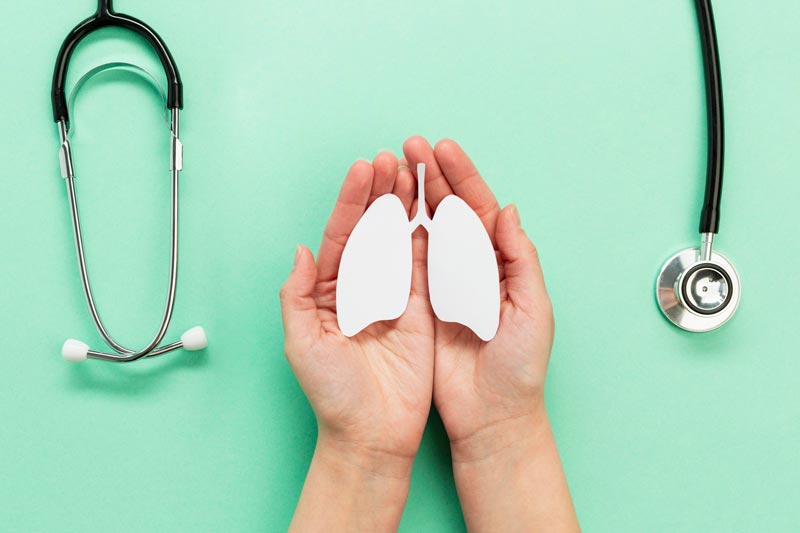Women’s lung health and wellness is an important yet often overlooked topic. As a result, it’s essential to understand the significance of pulmonology in women’s health and to be proactive in promoting lung health and wellness.
Dr. Jasdeep Sidana, MD, a pulmonologist with expertise in lung care, has recently released a guide to help women optimize their pulmonary health and well-being. In this blog post, we will discuss five of Dr. Sidana’s top tips for promoting lung health and wellness in women. Following these simple steps can help ensure your lungs stay healthy for years to come!
Understanding Common Lung Conditions Affecting Women
The first step in promoting lung health is understanding the common lung conditions affecting women. Dr. Sidana encourages women to consult with a lung specialist if they experience any of the following respiratory issues:
Asthma
According to Dr.Jasdeep Sidana, MD, asthma is characterized by inflamed airways and is one of the most common respiratory issues affecting women than men. According to the latest statistics,
around 25 million people in the United States have asthma, about 1 in 13 people, with the highest rates in Black adults. Furthermore, 9.8% of female adults have asthma compared to 6.1% of male adults of the same age group, with the former having hard-to-manage asthmatic symptoms.
Asthma symptoms include shortness of breath, wheezing, chest tightness, and coughing, particularly at night or early in the morning. Asthma is also often triggered by environmental factors such as dust, pollution, or exposure to irritants like tobacco smoke. Fortunately, many treatments and lifestyle changes can help alleviate these symptoms and keep women healthy.
This includes:
- Regularly taking a doctor-prescribed preventive asthma medication
- Avoiding triggers, such as cigarette smoke and dust
- Doing daily physical activity to strengthen your lungs
- Taking part in pulmonary rehabilitation programs
- Eating a nutritious and balanced diet
- Reducing stress levels
If you think you may have asthma, Dr. Sidana advises consulting a lung specialist as soon as possible to get an accurate diagnosis and develop a personalized treatment plan. Dr. Sidana also encourages individuals to be aware of potential asthma triggers and take proactive steps such as wearing a face mask or limiting exposure to second-hand smoke to reduce their risk of an asthma attack.
Chronic Obstructive Pulmonary Disease (COPD)
Chronic Obstructive Pulmonary Disease (COPD) is a severe and commonly unrecognized chronic lung disease that affects women’s health disproportionately. Furthermore, women tend to develop COPD at an earlier age than men, often due to environmental exposures or risk factors such as cigarette smoking and long-term exposure to air pollution, dust, and other lung irritants. Dr. Jasdeep Sidana, MD, emphasizes that COPD is a progressive disease that reduces physical activity and is characterized by persistent coughing, wheezing, fatigue, chest tightness, and shortness of breath.

The female reproductive system is also more sensitive than males, meaning that hormonal changes during pregnancy can lead to additional exacerbations of the disease. Despite this, COPD remains underdiagnosed in most women. Therefore it is essential for health care providers to be aware of the range of risks facing their female patients, including COPD, to provide timely diagnosis and clinical management as well as education on lifestyle modifications that may slow disease progression.
Lung Cancer
Lung cancer is a severe health issue for women and can be fatal. Unfortunately, women are twice as likely to develop lung cancer due to unrelated risk factors such as genetics, smoking, and exposure to air pollution. However, early detection through comprehensive screenings can be life-saving — studies have shown that the 5-year survival rate can increase fivefold through continued care. Therefore, women’s health providers should preemptively assess their patients for symptomatic lung cancers, along with other common screenings like mammograms and Pap smears, to provide early prevention or diagnosis when appropriate.
Dr. Sidana emphasizes that early detection through regular screenings and healthy lifestyle habits can reduce the likelihood of developing lung cancer and increase successful outcomes when detected early. Regular check-ups with your healthcare provider should include a discussion about lung cancer prevention and management practices; this is particularly true of high-risk individuals such as smokers or those with a family history of the disease.
Pulmonary Hypertension
Pulmonary Hypertension is a rare but serious condition that affects the lungs and heart. Dr. Sidana explains that this condition causes the walls of the pulmonary arteries to thicken and narrow, making it more difficult for blood to flow through them. Symptoms can include:
- Shortness of breath
- Fatigue
- Dizziness
- Chest pain or tightness
- Rapid heartbeat
Furthermore, women are three times more likely to develop pulmonary hypertension than men; this is thought to be due to differences in how hormones like estrogen affect blood vessels and their capacity for blood flow.
Pulmonary Hypertension cannot be cured, but Dr. Sidana recommends various treatments depending on the severity of the condition. Treatment options may include lifestyle modifications (such as avoiding high altitudes, reducing salt intake, and exercising regularly), medications, or even transplantation of the pulmonary artery if necessary. Dr. Sidana also stresses that it is essential to be aware of the symptoms and seek medical attention if they persist or worsen.
Importance of Quitting Smoking
Smoking is a significant risk factor for lung health, and quitting smoking is one of the best things women can do to improve their lung health. The harmful chemicals in tobacco smoke can cause damage to the lung’s airways, increase the risk of lung cancer, and worsen symptoms of lung conditions such as COPD and asthma. Quitting smoking can improve lung function and reduce the risk of developing lung conditions, making it a critical step in promoting lung health and wellness.

Tips for quitting smoking include:
- Seeking support from friends and family
- Using nicotine replacement therapy
- Avoiding triggers that can lead to smoking
The benefits of quitting smoking for lung health include improved lung function and reduced risk of lung cancer and other critical lung conditions.
Maintaining a Healthy Lifestyle
A healthy lifestyle is crucial for maintaining good lung health, and there are several ways women can promote wellness. For example, a diet rich in fruits and vegetables can help maintain good lung health, while regular exercise can improve lung function and prevent the onset of lung conditions. Getting adequate sleep is also important, as sleep is essential for repairing and restoring the body, including the lungs.
Mindfulness and stress reduction can also be critical in maintaining good lung health. Studies have shown that stress can worsen symptoms of lung conditions such as asthma and COPD, so it’s essential to manage stress levels and incorporate mindfulness practices such as meditation and yoga into daily life.
Regular Medical Check-Ups
Lastly, Dr. Sidana stresses the importance of regular medical check-ups to ensure that any issues or concerns with lung health are identified early and addressed promptly. Regular medical check-ups can also provide an opportunity to discuss risk factors for lung conditions and preventive measures such as quitting smoking, maintaining a healthy lifestyle, and getting immunized against diseases such as influenza and pneumonia.
Furthermore, consultation with a pulmonologist, such as Dr. Jasdeep Sidana, MD, is also essential in maintaining good lung health. A pulmonologist can diagnose and treat lung conditions, advise lifestyle changes, and monitor lung function to ensure optimal health.
Conclusion
Dr. Jasdeep Sidana, MD, emphasizes the importance of promoting lung health and wellness for women. Following the five steps outlined in this blog can help to improve overall lung health, reduce risk factors for lung conditions, and ensure that any issues or concerns are identified and addressed early on. Dr. Sidana also recommends that women make an appointment with a pulmonologist as soon as possible to begin the journey toward better lung health and wellness.
